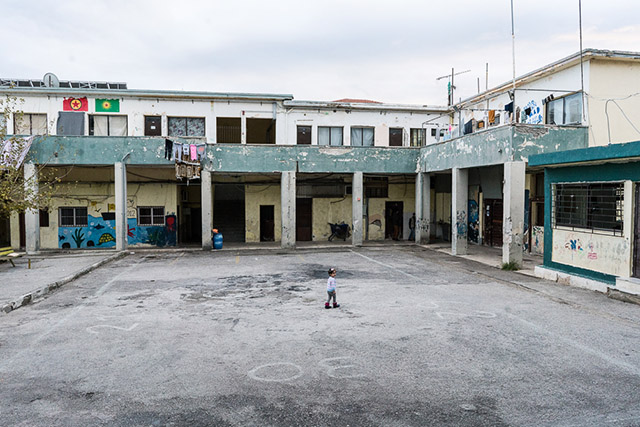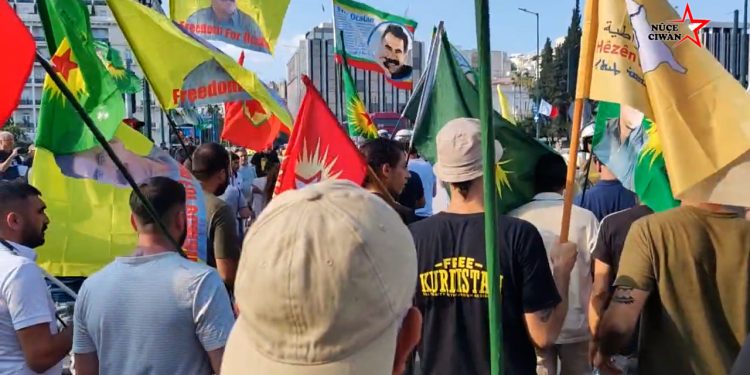ATHENS – Today the Lavrio Refugee Camp in Greece was raided. The Greek police raided the Lavrio Camp, where the Kurdish people live, at around 03:00 today. It is stated that the Greek police forcibly took the people living in the camp to the closed camps 200 km away.
Refuting the Greek Ministry of Asylum and Migration’s statement that “refugees voluntarily evacuated the refugee camp in Lavrio”, the Democratic Kurdish Cultural Centre of Greece called for a protest today. The refugees in the camp and the Democratic Kurdish Cultural Centre in Greece condemned this action of the Greek police and the Greek Ministry of Asylum and Migration and stated that they will make a detailed statement in the coming days.
A demonstration was atended by hundreds of people from the Kurdish community and Internationalists, that protest the decision to evict the refugees form the camp.
The tense relations between the two neighbours have thawed since the 6 February earthquakes that hit Turkey’s south, but the decision on the refugee camp was made before the disaster, the Greek daily said. The Municipality of Lavreotiki have several times warned against the poor condition of the refugee camp building, which to a large extent hosts Kurdish refugees.
After the municipality was notified about the approximately 150 refugees residing at the camp, 100 were transferred to other shelters in Attica, Ekathimerini said, adding that the remaining refugees will soon be transferred to other facilities.
A self-governed camp
The camp occupants’ refusal to abandon their self-governance served as an excuse for the Greek State’s withdrawal.
“There’s an organization in the camp. A committee is elected by the occupants, of which I’m the spokesperson,” Sedat, a man in his forties, explains. “We organize daily life within the camp, we manage communications with the associations who come in, with the Greek government. We must also manage hygiene and life in general. Within this committe, there is also a youth committee subdivided into several sub-committees: culture, art…We must manage the circulation of people, the budget, it’s difficult but with so many refugees, it’s important work. The occupants choose their representatives and we manage as best we can until we leave. Then, they hold new elections.”

“350 people live here. Women, men, in all kinds of situations. They can stay between a year to two and a half years. Most stay between 5 to 6 months. There is no governmental aid nor aid from international organizations. We must organize and cover all our expenses. We hope the Greek government won’t use any kind of force against us, but we think the Greek people will be on our side, the camp has existed for over 35 years. The PKK is well known locally, and so are the Kurds. The Turkish government has exerted pressure on the Greek government in an attempt to destroy this camp. We make a local contribution to the Greek economy by buying from the local bakery, and from the local shops. The Greeks are also suffering from a financial crisis, but we try to link up with the local people. We try not to be too much of a bother. We know we are in their country, that we are guests here.”
Even more than the precarious living conditions, the hardest for the refugees is dealing with the waiting and the boredom that settles over them along with the feeling of no longer having any grip over the course of events. Despite the days that stretch out, all of them hang on to the hope of rapidly finding a way to reach the country of their destination.
For them, Greece is nothing but a transit station. Uncertainty about the future keeps them from investing fully in the present moment. Starting an activity in the camp, learning Greek, launching a project with an objective in the middle term, would be acknowledging that the wait may be long, thus pushing further into the future the goal they gave themselves when they took the hard decision to leave – a choice that was no such thing when the alternative was either prison or death; an expensive choice also, smugglers demanding several thousand euros at each stage of the journey, eliminating by the same token the ones who can’t afford to leave. Far from family and friends, the exiles’ morale gets eroded as the months go by, even if friendships are born in the camp between people sharing common histories and cultures. Reunions also, on occasion, with old companions from the struggle or from university.
A daily discipline is needed to fight against boredom. The main camp has some thirty living spaces. Some are occupied by entire families, others by individuals, some are reserved for women. Each room self-organizes. Money required for food is shared under the care of the designated “clerk”, and every week, the group goes for collective shopping at the market, which allows for cheaper purchases. Daily housecleaning and cooking chores are rotated.
Every week, the occupants of each room meet to criticize and self-criticize, and to discuss ways to improve the organization. This is also the time for resolving any tensions that may have cropped up: so-and-so did not wash the dishes when it was his turn to do so, another stayed in bed past noon… Or to express one’s unhappiness, as did G. who talks about the depressing time at New Year’s, far from his family, after spending six months waiting, and seeing no end to it. Each room then designates a representative to the camp’s general assembly which chooses the elected committee for the overall organization. This system is based on that of democratic confederalism, the PKK’s political paradigm since 2005, which aims at organizing society in assemblies, from the lowest rung, known as the commune, to the largest. Within the camp, each room thus corresponds to a commune.
The youth committee also attempts to organize activities. Discussion sessions and debates are held four days a week. The passing months see different celebrations or commemorations. In December, for instance, a ceremony was organized to honor the martyrs of Roboski and, a few days later, a large section of the camp got involved in organizing the New Year celebration, a rare moment of collective relaxation.




